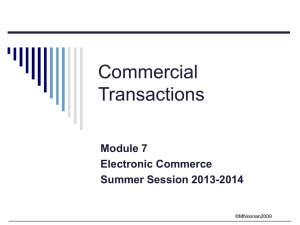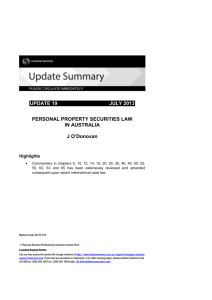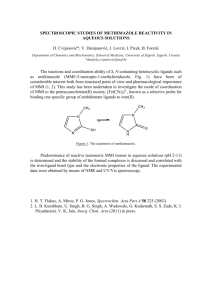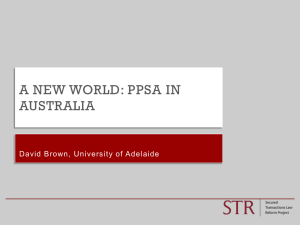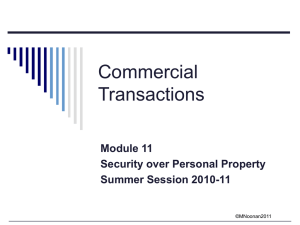security interest
advertisement
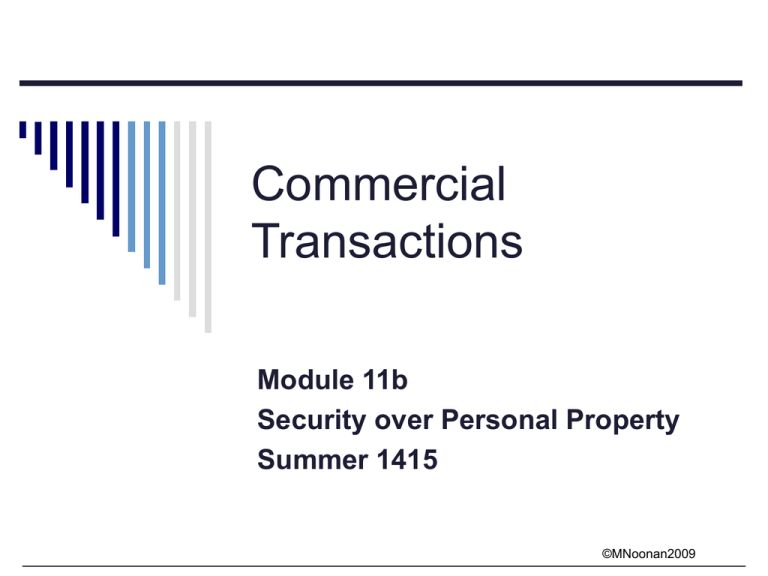
Commercial Transactions Module 11b Security over Personal Property Summer 1415 ©MNoonan2009 This presentation and Copyright therein is the property of Maureen Noonan and is prepared for the benefit of students enrolled in the Commercial Transactions course conducted by the Law Extension Committee and is available for their individual study. Any other use or reproduction, including reproduction by those students for sale without consent is prohibited. ©MNoonan2009 Title and security Under the old law, title was often retained as part of a financing in order to maintain priority. E.g. car leasing arrangements, supplier ROT clauses. Bailment was often used to displace the usual rule (SOGA) that risk prima facie passes to buyer with transfer of title, so that buyer had legal and economic risks prior to obtaining title. The PPSA adopts a substance rather than form approach. While ownership retains its legal form, in certain cases, registration and other acts are required to retain priority. ©MNoonan2009 Commercial Finance & Security In order to understand the concept of security and the application of the PPSA, it is first necessary to understand the methods of financing a commercial enterprise, so that one can see the interaction between and relative legal positions of actors such as: Banks and principal financiers and security holders Entities that finance the purchase price of new items e.g. cars, trucks, machinery via leasing/hiring Suppliers not be paid at the time of supply. Customers who may not have taken delivery/paid Receivers of insolvent enterprises Insurers ©MNoonan2009 Title and the ability to create security One must have the right to create a security in order to be successful. In Sally Anne Horsley the antique furniture had already been gifted to the mother when the son tried to create security over it….so he had no capacity to do so. ©MNoonan2009 Sally Anne Horsley v. Phillips Fine Art Auctioneers Pty Ltd - SCNSW 31.07.95 No. 3211/92 Concerns gifts, bills of sale, conversion. Anthony Spies and his brother Carl lived with their parents in The Swifts. Their company Minjar purchased this property in Darling Point from the Catholic Church in 1986. It executed a Mortgage back. In the same year Carl and Anthony as Mortgagor executed an Ordinary Bill of Sale over certain antique furniture and chattels in favour of the Church. Anthony Spies claimed the 1986 BS was discharged in 1987. Court found it more probably than not that it was paid out (32). The evidence was slim but an inference was raised by the fact that there was a later BS granted by Carl alone (the 1990 BS) to secure unpaid interest from the mortgage over ... “all furniture and furnishings mow and hereafter situated in the premises known as The Swifts ...” ... same furniture as in the 1986 BS. ©MNoonan2009 Sally Anne Horsley v. Phillips Fine Art Auctioneers Pty Ltd - SCNSW 31.07.95 No. 3211/92 cont (2) This coincided with the principal mortgage being discharged and a refinancing by Minjar with St George. BS transferred to St George in 1992. St George seized the furniture. Anthony claims a half interest and sues in conversion. He had to show that he had title to the furniture, that St George converted it and he suffered quantified loss and damage. St George contends that Anthony failed to establish any of these and that prior to the grant of the BS, the furniture had been gifted to their mother in 1987. Anthony gave evidence of the gift to his mother in 1987 (33). See later paragraphs for discussion of an effective gift … delivery 53-83,84, 85, 86, 87. ©MNoonan2009 Registration systems A means of putting others on notice of a situation. The idea is that others can look after themselves if they have a means of knowing the situation. Under the old law, this was very difficult because although there were registers, there were a myriad of different ones for different types of property, different types of entities, whether Commonwealth or State laws governed the situation. Some forms of property were not covered at all, so there could be no register of those security interests. ©MNoonan2009 The 2011 main old Registration Systems 1. Corporations-Corporations Act (Cth) 2. MVs and Boats-Registration of Interests in Goods Act (NSW) 3. Non company other-Security Interests in Goods Act (NSW) 4. IP-Patents Act, Trade Marks Act. (Cth) ©MNoonan2009 Problems with old State and Federal registration systems It is not possible to register interests over some classes of property e.g. many intangibles, retention of title clauses. Coverage varies from jurisdiction to jurisdiction e.g. boats not covered in REVs in all states. Dual registration may be necessary e.g. Corp +Revs in Tasmania. Technical compliance may affect validity e.g. agricultural mortgage in particular form. Interaction of registration systems can deliver complex outcomes e.g. failure to register under Corp law does not affect validity but technical non compliance with state law will. Mandatory registration can be difficult to manage e.g. security holder must anticipate whether collateral might be moved to another state May be a need to register in more than one state May be a need to search in more than one state Registration may be cumbersome..e.g. paper lodgement rather than electronic Registers may not be available for searching on line May be costly for parties not involved to take proper precautions ©MNoonan2009 Priorities 1. Generally 2. Within systems 3. Between systems and non-registerable securities. ©MNoonan2009 Priorities 1. Equities being equal, first in time of creation prevail. 2. Equities being equal, preference given to legal over equitable. Subject to special rules, etc., for: Purchasers without notice. Fraud, estoppel and gross negligence. Dearle v. Hall. Statutory registration rules. Bankruptcy and Liquidation Statutes. Provisions re “tacking”. Marshalling of assets. ©MNoonan2009 Companies-priorities Owners, title holders not creditors prior to PPSA. The usual order for creditors in case of insolvency-1. Fixed charges, mortgages 2. Preferential creditors (including employees) 3. Floating charges 4. Unsecured creditors 5. Subordinated (unsecured) creditors 6. Equity claimants-preference shareholders 7. Equity claimants-ordinary shareholders 8. Equity claimants-deferred shareholders ©MNoonan2009 FIXED and FLOATING charges. What is the difference? When a charge is taken, no transfer of ownership. A particular asset is set aside so if chargor fails to pay, chargee is entitled to receive and apply proceeds of sale against the liability. Fixed charge given over a specific piece or pieces of property. A floating charge “floats” over the assets until it crystallises and becomes fixed in accordance with terms of charge. A fundamental difference is right of the chargor to deal with the asset during the charge. Under a floating charge, chargor can deal with it in ordinary course of business until crystallisation. Where a fixed charge given, no right to deal with it without consent chargee. ©MNoonan2009 Circulating asset Note that post PPSA the distinction between fixed and floating disappears for most purposes: There are securities over: Circulating Assets (mostly previous floating charge) Non circulating assets They might still be called floating and fixed charges, but they will be dealt with in accordance with PPSA concepts for purposes of law relating to security over personal property. ©MNoonan2009 Companies-priorities It can be seen from previous list that creditors would make a considerable effort to be a secured creditor in order to get to top of list. However, there is some pressure to leave a company debtor free to use secured property in the ordinary course of business-- to generate cash flow to service the debt. A problem sometimes arose with characterisation of charges.-e.g. book debts-is a charge over book debts fixed or floating? ©MNoonan2009 Assignment of book debts-factoring Distinguish an assignment from a charge A Legal assignment must comply with s. 12 of the Conveyancing Act. Assignee is then the “owner” of the debt and questions of priority do not arise. An equitable assignment for value need not satisfy notice to debtor requirement, but may lose priority to an assignment where notice has been given. It can be by way of security, but may lose priority to a registered charge. ©MNoonan2009 Legal Assignment Must be absolute assignment..outright transfer, not by way of security or conditional. Must be in writing under hand of assignor Must be express notice in writing to the debtor, stating the fat of the assignment, the name of the assignee, date of assignment and amount of the debt. Advantages No consideration is required, Assignee can sue in their own name Debtor can safely pay assignee, Legal interest obtained for value and without notice of earlier equitable interests will have priority ahead of them. Disadvantages Identity assignee known, stamp duty payable, must be whole debt (not part) and not by way of security. ©MNoonan2009 Equitable assignments of book debts Clear expression of intention to assign required Subject matter must be identified with certainty Where consideration, effective from time it is paid Assignor continues to be “owner”, so assignee is trustee. Advantages No notice required (may be defeated by person who takes later interest but gives notice first if they have no notice of earlier interest-can protect by taking charge over legal interest retained and register with ASIC), may be conditional, by way of security, part only, writing is not required if supported by consideration, and if done correctly stamp duty not payable Disadvantages Assignor must be a party to any enforcement action, assignee takes interest subject to equities arising before notice (including rights of set off or counterclaim by debtor) and can lose priority to another assignee who gives notice before them. ©MNoonan2009 The trouble with book debts Effectiveness of fixed charge over book debts upheld in 1979 decision of Siebe Gorman & Co Ltd. v. Barclays Bank Ltd (1979) 2 Lloyd’s Rep 142 and later in 1986 Supreme Court Ireland Re Keenan Bros Ltd (1986) BCLC 242 PC in Agnew disagreed with Siebe decision and found charge in Agnew only a floating charge because debtor could use proceeds in ordinary course of business. The Hof L in National Westminster Bank plc v. Spectrum Plus Limited (2005) UKHL confirmed lower decision of High Court of England-if a charge permits the chargor to deal with any proceeds of realisation of book debts in ordinary course of business until some further step is taken, charge is floating, irrespective of how parties classified it. Although these decisions are persuasive and not binding in Australia, if applied, for a charge over book debts to be fixed, chargee must have control over book debts and proceeds. ©MNoonan2009 Creation of fixed charges over book debts -the practicalities. Successful strategies include: A prohibition in the charge against the company realising debts itself whether by assignment or collection without consent of chargeholder. More realistically commercially, the chargeholder appoint the company its agent to collect the debts for its account and on its behalf. Pay into blocked account so money not available as a source of cashflow. However, blocked account must operate in substance as well as in name to be effective-chargor must be denied right of access for withdrawals, any payment out of the account must be at chargee’s discretion and to be safe a separate decision by the bank on a case ©MNoonan2009 by case basis whether or not to release monies. Sample problem-Orbis Communications Orbis Communications Limited (Orbis) provides internet services to businesses. Nibelheim Industrial Bank (Nibelheim) holds a floating charge over all business assets. Principal assets comprise telecommunications and computer equipment, accounts receivable and cash in an NAB account. The floating charge contains a restrictive covenant prohibiting Orbis from creating subsequent security interests ranking equally, or ahead, without consent Nibelheim. An automatic crystallisation clause in the event of any breach. Menard Finance Limited has agreed to advance funds to Orbis and take a fixed charge over receivables and floating charge over bank account-requires Orbis to deal with receivables in accordance with instructions of Menard. In absence instructions, Orbis must collect them in ordinary course business and pay them into their bank account but is otherwise prohibited from dealing with them. Orbis may deal freely with proceeds in the ordinary course of business prior to the crystallisation of the Menard floating charge over the bank account. Orbis is experiencing difficulties. Menard has requested your advice on legal status of its security interest and its priority vis a vis Nibelheim. ©MNoonan2009 Securities over IP Is registration of a security interest granted by a company over IP under Corporations Act sufficient to create a valid security interest? Compare and contrast: Copyright Trademarks Patents ©MNoonan2009 Security interest in a Patent If a company is granting a charge over a Patent, the Corporations Act requires it to be registered on the Australian Register of Company Charges and the Patents Act allows it to be registered. Should it be registered on both? Yes, because in many cases the Patents Act provisions will determine priority.e.g. if there is a priority dispute between an assignment of a patent and a security interest over the patent, then the Patents Act would apply because the priority sections of the Corporations Act only apply to disputes between security interests. If Patents Act silent (e.g. in relation to priority disputes not involving a patentee or between 2 interests not registered anywhere), the priority rules of the Corporations Act will apply. ©MNoonan2009 Copyright In Australia, the Copyright Act applies. No formalities are required to obtain copyright and there is no copyright register. This creates certain problems in being sure who is the owner and capable of transferring title or granting a licence. An assignment has no effect unless in writing and signed by the assignor s. 196 CA. If X transfers a copyright to A and then grants a security interest in the same copyright to B, B gets nothing because the prior legal interest of A prevails over the subsequent legal or equitable interest to B. If X grants a license to A and then a security interest to B, B takes subject to A’s license. ©MNoonan2009 Copyright and notice If an Australian work is registered in the US Copyright Office, are the details on the US Register (which notes assignments and security interests) notice to Australian lenders? e.g.An Australian Co,D, creates a computer game.It registeres this work in the US Copyright Register and obtains a loan from a US bank, securityed against all copyright owned by D. USBank regsiters its security interest in the US Copyright Register but not in the Australian Register of Company Charges. Later, D grans a similar security interest to OZbank, who searches the Australian Register of Company Charges, finds nothing and registers its security interest. Is OXbanks security interest subject to USBanks security interest? Possible answers: OZbank taken to have constructive notice of the security interest recorded in the US and so USBank’s charge has priority. Alternatively OZbank taken to have constructive notice only of security inteests recorded in Australia. Or, because copyright is territorial, USBank has priority over US copyright and OZbank has priority over Australian copyright. Result uncertain. A prudent Australian lender would search the US register and the local company register. If they were clear, they would require D to register any significant works with the US Copyright Office and then record the security agreement with the US Copyright Office against each work, require future works to have the same treatment. ©MNoonan2009 The New Regime STUDENTS PLEASE NOTE Any and all examination questions will proceed on the assumption that the Personal Property Securities Act 2009 (Cth) has been in force for the entire time of any facts referred to. ©MNoonan2009 The new regime Focus: 1. 2. 3. 4. 5. 6. 7. The overall scheme What is a security and what is not ? Purchase money security interests PMSI PPS Leases The position of Liens Priorities between different types of interests When a buyer can take free of a security interest We are concerned with personal property securities over tangible personal property and are not covering securities over bank deposits, shares or other intangibles. ©MNoonan2009 Personal Property Securities Act 2009 & Regulations See www.ag.gov.au/pps for more information Creates a single national register incorporating current Corporations Charges Register, REVs, IP, State non corporation registers. Legislation ceding powers to Commonwealth and consequential changes going through. Searchable online. Refer to website. Notification register only. No copies of documents. Some conceptual changes and new terminology Sets out priority rules. ©MNoonan2009 Review of PPSA Because of the dramatic change to the law and the effect on business, a Review is underway (July 2014 to date), to assess the impact of the PPSA on business, and scope for efficiencies in administration. Changes affecting title to goods have shocked many businesses and many have not absorbed the changes in time to protect themselves and their operations from loss. Particular submissions can be seen on http://www.ag.gov.au/Consultations ©MNoonan2009 Other jurisdictions As the PPSA is new in Australia, there are only a few decided cases on it. However, similar legislation has existed in NZ and Canada for some time. As a result, there are decisions in those jurisdictions on sections similar to the Australian provisions which may be referred to because the reasoning may be persuasive when our judges are considering our provisions. ©MNoonan2009 The setting Active company or other entity conducting trade, business or providing service, information. Usually has a banker, who may or may not also provide general finance, secured or unsecured. Some equipment or stock may be leased or on floorplan (bailment) from a different financier. There may be liens arising in the course of business-possessory (bankers, repairers, carriers, solicitors), statutory, equitable. They may lease items to customers, associates. Individual transactions may create securities for their duration. E.g. purchase of a business with time to pay for stock and retention of title until paid for. ©MNoonan2009 How might Real Estate Transactions be affected by PPSA? Examples: Abandoned goods clauses in leases which permit a landlord to retain and sell abandoned goods …security for outstanding rent? Taking security over “tenants fixtures” Clauses in mortgages assigning rents or insurance Bailment arrangements in construction e.g. scaffolding Security deposits? Temporary sheds etc in place during construction projects Law may override restrictions on assignment of debts in agreements. Rights including “Step in Rights” in construction contracts. ©MNoonan2009 Franchises A Franchisor might: Provide goods on credit to a franchisee Lease goods to a franchisee Sell a franchise business on a deferred payment basis Acquire goods from suppliers on a credit, lease or similar basis The Franchisor will most likely have to register their interest on the PPSA register to protect themselves against losing priority to another creditor or losing title to their goods. ©MNoonan2009 The construction industry Assume a principal (P) and a contractor (C), performing earthworks. Should the contract be termed a “Security Agreement” to enable P to protect itself by registering one or more security interests? Step in/Take out rights-right for P to take over works if C becomes insolvent- a security?-should be registered as a security interest Is a contractor’s right over temporary works (items on site during construction, but removed on completion) a “security” and registrable pending payment? ROT clauses? Register or lose item. Retention funds-right to hold back funds pending satisfactory completion of something-a security? Confidentiality issues re s. 275-certain “interested persons” may require secured party to send a copy of a contract. Waiver of PPSA obligations contained in Chapter 4-numerous procedures for notices and enforcement on default? ©MNoonan2009 How might mining transactions be affected? Farm in and farm out arrangements where a farmor retains title to an asset until completion of the farm-in work Buyers of assets will need to know when they will acquire free of security interests Joint venture agreements may create security interests under default provisions Comingled goods ©MNoonan2009 Are Leases securities under PPSA? Examples: A lessor of portable buildings for more than 1 yr Lease of an oil rig Lease of equipment Lease of cars ©MNoonan2009 Manufacturers/wholesalers Supplying goods on ROT terms Supplying goods on ROT and cross collateralising Supplying goods on consignment Leasing equipment (including hire purchase) Loaning goods to customers or contractors Storing goods on third party premises Assigning book debts, receivables or agreements ©MNoonan2009 Ramifications for Insurers Examples: PPSA relevant when subject matter of policy is personal property subject to a security interest. A right to payment of a claim may be subject to an interest Subrogation or assigned rights will be subject to any valid security interest subsisting at the time the insurer’s interest arises Salvage rights Claims payments-to whom should the payment be made? Security interests noted on the policy-if insured denies any security interest exists, should insurer search anyway? Policy drafting-an indemnity in favour of the Insurer? Register searches-should they be done as a matter of course? When? Professional Indemnity Claims-likely to increase with lawyers taking a long time to come to terms with new provisions? ©MNoonan2009 PPSA-company charges Floating charges remain, but distinction between floating and fixed re priorities disappears with registration. Conceptually a fixed charge becomes a security interest attached to an asset that is a non circulating asset. Floating charge becomes a security interest attached to a circulating asset. ©MNoonan2009 Stages in taking security Attachment-requirements for creation as between parties Perfection-requirements for efficacy against third parties Priority-situation and rules for determining outcome where there are competing interests ©MNoonan2009 Perfection and Priority Registration systems Registration of securities on a public access register is seen as a way of alerting others to the extent to which an entity has financed activities. A new lender or business partner/supplier can therefore protect themselves by searching the Register. ©MNoonan2009 The floorplan arrangement Car dealers (and many other retailers) cannot afford to own all stock. A Manufacturer sells cars to a Financier who, in turn, provides the cars to a Dealer Limited pursuant to a Bailment agreement entitling the Dealer to display them and sell them to third party purchasers (be they other dealers or end customers). The floor plan bailment documentation contains a retention of title (ROT) clause in favour of the financier until the Dealer pays them for that vehicle.In other words, the Financier owns the cars until the Dealer sells them to someone else and pays the Financier. Often, a Bank or other financier who provides general banking and finance facilities, has a fixed and floating charge “over all present and after acquired property” of a Dealer to secure those lines of credit. These charges may be entered into, before or after floorplan arrangements. Customers who come into the dealership and agree to purchase a car often need finance. That customer usually pays a deposit and either borrows the rest from a financier (giving security over the car) or, the dealer sells the car to the financier who then leases it to the customer. In the first situation, the customer owns the car. In the second situation, title to the car is with the financier. ©MNoonan2009 The floorplan arrangement How did this sample arrangement operate under the old law? How does this arrangement operate under the new regime? What must each party do to protect it’s interests? What is the outcome for each person if the Dealer sells the car to a purchaser, but does not account for the proceeds to the Financier? ©MNoonan2009 Floor plan arrangements Manufacturer makes car Manufacturer sells to Financier (F) and title passes to F. F provides the car to Dealer (A) for on sale to third parties (either consumers or other dealers) on title retention basis (ROT clause)… Under old law this was not a charge (so if A is a corporation, not registrable on ASIC Corporations Register) and not registrable on REVs…it is a bailment by F to A But under new PPSA, to obtain a perfected security interest, F must register. To obtain PMSI super priority, F must register PMSI interest. The agreement must be in writing signed by the grantor to be effective against third parties. ©MNoonan2009 PPSA s. 12 meaning of Security Interest (1) A security interest means an interest in relation to personal property provided for by a transaction that, in substance secures payment or performance of an obligation (without regard to the form of the transaction or the identity of the person who has title to the property). Note: For the application of this Act to interests, see section 8. i.e. function/substance over form Section 12(2) makes the functional approach clear ©MNoonan2009 PPSA s. 12(2) (2) For example, a security interest includes an interest in relation to personal property provided by any of the following transactions, if the transaction, in substance, secures payment or performance of an obligation: (a) a fixed charge; (b) a floating charge; (c) a chattel mortgage; (d) a conditional sale agreement (including an agreement to sell subject to retention of title); (e) a hire purchase agreement; (f) a pledge; (g) a trust receipt; (h) a consignment (whether or not a commercial consignment); (i) a lease of goods (whether or not a PPS lease); (j) an assignment; (k) a transfer of title; (l) a flawed asset arrangement. ©MNoonan2009 PPSA s. 12(3),(3A) and (4) (3) A security interest also includes the following interests in relation to personal property, whether or not the transaction concerned, in substance, secures payment or performance of an obligation: (a) the interest of a transferee under a transfer of an account or chattel paper; (b) the interest of a consignor who delivers goods to a consignee under a commercial consignment; (c) the interest of a lessor or bailor of goods under a PPS lease….which includes a floorplan arrangement. (3A) A person who owes payment or performance of an obligation to another person may take a security interest in the other person’s right to require the payment or the performance of the obligation. (4) Without limiting subsection (3A): (a) an account debtor, in relation to an account or chattel paper, may take a security interest in the account or chattel paper; and (b) an ADI may take a security interest in an ADI account that is kept with the ADI. ©MNoonan2009 PPSA s.12(5) and (6) (5) A security interest does not include: (a) a licence; or (b) an interest of a kind prescribed by the regulations for the purposes of this section. (6) A security interest is not created only by an agreement or undertaking to do either of the following: (a) to postpone or subordinate a person’s right to payment or performance of all or any part of a debtor’s obligation to another person’s right to payment or performance of all or any part of another of the debtor’s obligations; (b) to postpone or subordinate all or any part of a secured party’s rights under a security agreement to all or any part of another secured party’s rights under another security agreement with the same grantor. ©MNoonan2009 Note the position of liens Act does not apply to…..(except as provided….) See section 8 of PPSA for full list, which includes: (b) (other than s. 73)A lien, charge or any other interest in personal property, that is created, arises or is provided for under a law of the Commonwealth (other than this Act), a State or a Territory unless the person who owns the property in which the interest is granted agrees to the interest. (c) (other than s. 73) a lien, charge, or any other interest in personal property, that is created, arises or is provided for by operation of the general law. (d) (other than s. 80) Any right of set-off or right of combination of accounts… ©MNoonan2009 Note the priority of liens under certain conditions s. 73 An interest (the priority interest) in collateral has priority over a security interest in the collateral if: (a) the priority interest arises…. (i) under a law of the Commonwealth, a State or a Territory, unless the person who owns the collateral in which the priority interest is granted agrees to the interest; or (ii) by operation of the general law: and (b) the priority interest arises in relation to providing goods or services in the ordinary course of business; and (c) the person who holds the priority interest provided those goods or services; and (d) no law of the Commonwealth, a State or a Territory provides for the priority between the priority interest and the security interest; and (e) the person who holds the priority interest acquired the interest without actual knowledge that the acquisition constitutes a breach of the security agreement that provides for the security interest ©MNoonan2009 Deemed security interests Note that in some cases, certain transactions are deemed to be security interests even if they do not secure payment or the performance of obligations. e.g. lease for more than one year transfer of receivables. How does this differ from current legal situation? ©MNoonan2009 Definitions See Dictionary in section 10. Often the full definition is given there. Where there is a special section providing a definition, there is reference to that section. E.g. “attaches” has the meaning given by section 19. ©MNoonan2009 Parties to transactions A person who provides credit (who may be called financier, consignor, lessor, bailor, transferor) known as a “secured party”. Person who has the interest in the property is “grantor” Person who owes money or performance of obligation will be “debtor”. “grantor” and “debtor” will be same person, other than in complex financing arrangements. Property subject to a security interest is referred to as “collateral” ©MNoonan2009 Rights between the parties While agreements set out the rights between parties and while the PPSA may not change the nature of those agreements and the legal rights created by them, the rules about validity, priority, insolvency and enforcement in the PPSA can enhance, negate or affect the value of those rights. e.g. the nemo dat rule, general law rules of priority ©MNoonan2009 PPS Lease Is our floorplan arrangement a PPS lease? See s.13 for definition: A PPS lease means a lease or bailment of goods; (a) For a term of more than one year; or (b) For an indefinite term (c) For a term of up to one year that is automatically renewable…. (d) For a term of up to one year,, in a case in which the lessee or bailee, with the consent of the lessor or bailor, retains uninterrupted..possession…..for a period of more than one year (e) For goods that may or must be described by serial number in accordance with the regulations…..(which includes MVs)..for 90 days or more or less than that but automatically renewable for terms which might be 90 days or more. But only if part of business…etc in (2) Floorplan bailments are therefore PPS leases. Clear from policy perspective that legislature wants them to be treated as PPS leases. They may also be commercial consignments, but perhaps only special types would be. See definition of commercial consignments. ©MNoonan2009 Purchase Money Security Interest PPS lease also a PMSI See definition PMSI s. 14 PPSA. (1) A PMSI means… (a) A security interest taken in collateral, to the extent that it secures all or part of its purchase price; (b) A security interest taken in collateral by a person who gives value for the purpose of enabling the grantor to acquire rights in the collateral, to the extent that the value is applied to acquire those rights; (c) The interest of a lessor or bailor of goods under a PPS lease; (d) The interest of a consignor who delivers goods to a consignee under a commercial consignment. See rest of definition for exceptions and clarifications. ©MNoonan2009 Super priority Remember PMSI and super priority? What is super priority? See s. 62 PPSA Why does a perfected PMSI get this? Usually inventory/circulating assets and background financier generally content that this finance is provided in addition to general financing by another lender. Old ROT situation, so enables a similar priority, done differently. ©MNoonan2009 The stages for PMSI Attachment-written agreement or possession by secured party. Perfection- registration. Priority-Super priority to the extent of the purchase price over other security interests accorded by act if correctly attached and perfected. ©MNoonan2009 Attachment A security interest will be effective according to its terms, and may cover after acquired property. S. 18 It will only be effective against the grantor if it has attached to collateral.s.19-when grantor has rights in collateral, can transfer it to secured party, value given or security interest otherwise arises….a grantor has rights in goods leased or bailed to grantor under a PPS lease, consigned to grantor or…when grantor obtains possession. In case of floorplan, grantor has at least a possessory interest and supplier has given value by virtue of supply. ©MNoonan2009 Perfection Main rule See s. 21. Idea is to make position visible to those who might otherwise deal with grantor. Perfection provides protection against third parties and against loss in an insolvency of grantor. A security interest in particular collateral is perfected if: (a) The security interest is temporarily perfected, or otherwise perfected, by force of this Act; or (b) All of the following apply: (i) The security interest is attached (ii) The security interest is enforceable against a third party (iii) Subsection (2) applies….registration, possession…in certain cases control. Perfection by possession is not practical for floorplan arrangements, so registration is the main way PPS lease PMSIs will be perfected. ©MNoonan2009 Enforceability against third parties. s.20 PPSA for general rule (1) A security interest is enforceable against a third party…only if; (a) The security interest is attached to the collateral; and (b) One of the following applies; (i) The secured party possesses the collateral; See s. 24 for what possession means…actual or apparent… (ii) The secured party has perfected the security interest by control (iii) A security agreement that provides for the security interest covers the collateral in accordance with (2)..(in writing signed by grantor or adopted by act and it contains description and statement that a security interest is taken) ©MNoonan2009 Enforceability against third parties So, Financier in Floor plan example Under section 20, for attached security interest of Financier to be enforceable against third parties, financier must have possession, control or security agreement in writing. As it is not going to have possession or control of the cars, written security agreement in accordance with s. 20(2) essential to protect rights of financier. ©MNoonan2009 One agreement to cover future orders Often businesses supply goods on terms and conditions that provide for future orders to be made by purchase order and include retention of title clauses. E.g. for just in time manufacturing, regular customers. According to Cooper Grace Ward Lawyers (24/10/12) some liquidators and receivers are taking the view that each purchase order forms a separate contract, each contract creates a new security interest, and so businesses need to register their interests for EACH supply, or be unsecured creditors! ©MNoonan2009 Third party rights Third parties can take free of a security interest in a number of situations s.43- if they buy or lease for value they take free of unperfected security interests. Therefore critical that financier perfects interest. S.44…buyer or lessee can take free of security interest if search by serial number only would not disclose registration that perfected security interest. Regulations propose that goods described by reference to serial number in PPS registration process…aircraft, MVs and watercraft….Must be so described if “consumer property”. s.45 Two special rules for MVs s.46 sales or leases in ordinary course of business…protects customers of dealers…does not apply where buyer/lessee holds goods as inventory s. 47 Special rule for low value domestic and household property…value not more than $5,000…does not apply to property which must be described by serial number or if actual knowledge. ©MNoonan2009 Third party rights s.44 example Person A owns a number of collectable motor vehicles in the course of running a business of hiring out vehicles for special events. A secures a loan from Bank B against the vehicles. B perfects its security interest by registering against all of A’s motor vehicles but does not register each MV individually by serial number. Person C buys one of the MVs from A. A search of the PPS Register by serial number would not disclose that B has a security interest. C would take interest in MV free of B’s security interest. Example from Explanatory Memorandum Rule does not apply if buyer or lessee holds as inventory or buyer or less was a party to security. ©MNoonan2009 Special rules for MVs s.45 Buyer or lessee can take free of security interest if they give new value, obtain their interest from the grantor and at a time between the day before the sale or lease and the time the sale or lease took place a search by serial number would not disclose the interest. Or if the seller/lessor is a person prescribed by regulations….draft regulations provide that dealers covered by state or territory MV dealer licensing schemes are to be prescribed persons. ©MNoonan2009 s. 45 Example In our floorplan example, Financier purchased MVs from Manufacturer and permits Dealer to retain them at its dealership for sale. Financier registers its security interest in each vehicle. Customer wants to buy a car with finance provided by Bank. Neither Customer nor bank needs search PPS register as Dealer is a licensed Motor Dealer and they acquire the car free of Financier’s security interest. Note rule does not apply if buyer or lessee holds vehicle as inventory or has actual or constructive knowledge. See also regulations. ©MNoonan2009 s. 45 Notice example D is motor vehicle dealer. Bank A has perfected a security interest in all vehicles at showroom by registering each vehicle against serial number. Security agreement obliges D to sell vehicles for amount determined by formula with minimum price of $x. T is an associate of D, though not a MV Dealer, and is aware D is obliged to sell vehicles for at least $x. D sells MV to T for amount significantly less than $x. T would not acquire the MV free of A’s security interest. Example from Explanatory Memorandum. ©MNoonan2009 s.47 Example P buys a chainsaw at a garage sale for $2,000 with the intention to use it in her hobby workshop. P is not aware of any security interest in the chainsaw. The market value is less than $5,000. P takes the chainsaw free of any security interest. Example from Explanatory Memorandum ©MNoonan2009 Priorities Rules in PPSA. See ss. 54-64 ©MNoonan2009 Priority Where a debtor defaults, there is a competition between various parties interested in obtaining items belonging to debtor to satisfy obligations. E.g. Liquidator, banks who provide overall facilities and services, finance companies who have financed inventory, machinery etc by leasing, floorplan arrangements, factors who have financed working capital by taking interests in receivables, customers, suppliers. ©MNoonan2009 Priority between interests s.55 Unless otherwise provided: (a) Perfected interests have priority over unperfected interests; and (b) priority between perfected interests amongst themselves and unperfected interests amongst themselves, is determined on a firstin-time basis ©MNoonan2009 Priority between unperfected security interests s.55 (2) Priority between unperfected security interests in the same collateral is to be determined by the order of attachment of the security interests ©MNoonan2009 Priority between perfected and unperfected security interests s.55(3) A perfected security interest in collateral has priority over an unperfected security interest in the same collateral ©MNoonan2009 Priority for perfection (4) Priority between 2 or more security interests in collateral that are currently perfected is to be determined by the order in which the priority time for each security interest occurs. (5) For the purposes of (4) the priority time..is, subject to (6), the earliest of (a) Registration time (b) The time security interest is perfected by possession or control (c) The time the security interest is temporarily perfected, or otherwise perfected, by force of this Act. (6) A time is a priority time…only if…the security interest remains continuously perfected….see s.56 for continuous perfection ©MNoonan2009 Priority and PMSIs s.62 PMSI has priority over a perfected security interest granted by same grantor in same collateral but which is not a PMSI if The PMSI is in inventory or its proceeds…the PMSI is perfected by registration at the time…for inventory that is goods….the grantor obtains possession…or for any other kind of inventory..the PMSI attaches to the inventory and…the registration that perfects the PMSI states in accordance with item 7 of the table in s. 153, that the interest is a PMSI For other than inventory see. S. 62(3) For priority between competing PMSIs. ©MNoonan2009 Priority and control Note that security interests perfected by control have the highest priority e.g. a security interest held by an ADI in an ADI account with the ADI has priority over any other security interest in the ADI account. An ADI has control over an ADI account held with the ADI (s.25). Only the ADI with which an ADI account is held my perfect a security interest in the ADI account by control (s.21). A security interest perfected by control has priority over any other security interest in the same collateral (s.57). NOTE: Security over ADI’s is not examinable. This example is to illustrate “control” ©MNoonan2009 Priority and control Under a floorplan arrangement, are the cars “inventory”? See definition of inventory and s.341(1B) Does a secured party have “control” of the cars? See sections 340 and 341 ©MNoonan2009 Inventory s.10 DEFINITION Inventory means personal property whether goods or intangible property) that in the course or furtherance, to any degree, of an enterprise to which an ABN has been allocated: (a) Is held by the person for sale or lease, or has been leased by the person as lessor; or……. ©MNoonan2009 Inventory and control s.341(1B) For the purposes of subsection 340(5) and this section; (a) Inventory has its ordinary meaning; and (b) (b) the definition of inventory in s 10 does not apply. Control of inventory (1) For the purposes of sub s 340(2) a secured party has control of inventory if: (a) the secured party and the grantor have agreed in writing that the grantor: (i) will specifically appropriate the inventory to the security interest; and (ii) will not remove any specifically appropriated inventory without previously obtaining the specific and express authority of the secured party to do so; and (b) the grantor’s usual practice is to comply with the agreement ©MNoonan2009 Priorities-insolvency s.267 upon insolvency an unperfected security interest can vest in the grantor. This is a radical change. Previously under floor plan arrangements, financiers were entitled to retrieve bailed goods because they were the owner. Short term PPS leases of up to a year are excluded if they are goods that may or must be described by serial number, which includes MVs. ©MNoonan2009 Company charges s. 339 (4)…reference to a fixed charge over property is taken to be reference to a security interest that has attached to personal property that is not a circulating asset s. 339(5)…reference to a floating charge ….taken to be a reference to a security interest that has attached to a circulating asset ©MNoonan2009 Company charges s.340 Meaning of circulating asset For the purposes of this Act if a grantor grants a security interest in personal property to a secured party, the personal property is a circulating asset if (a) The personal property is covered by (5) unless (2) or (3) applies or (b) In any other case-the secured party has given the grantor express or implied authority for any transfer of the personal property to be made, in the ordinary course of the grantor’s business free of the security interest. ©MNoonan2009 Company charges The exceptions in (2) and (3) If an effective registration discloses that secured party has control of the personal property and it does. For meaning of control see 341. If personal property is goods and security interest is perfected by possession ©MNoonan2009 Circulating asset s.340(5)….current assets An account that arises from granting a right or providing services in the ordinary course of a business… An account that is the proceeds of inventory An ADI account (other than a term deposit) Currency Inventory (note ordinary meaning and not s. 10 definition) A negotiable instrument For meaning of control and inventory see. S. 341 ©MNoonan2009 Floating charges Provided an equitable right to enforce against sufficiently identified /described collateral as and when it came into existence on crystallisation. In the meantime other interests could take priority Under new system, priority between two perfected interests is date of registration/perfection; otherwise first in time. Difficult conceptually to go “back”. See discussion regarding book debts. ©MNoonan2009 Priorities Perfected v. unperfected security Perfected security Perfected by control v. perfected by other means (including registration) Security perfected by control Perfected by control v. perfected by control Perfected by other means v. by other means Unperfected v. unperfected First in time perfection First in time of continuous registration and/or possession First in time of attachment ©MNoonan2009 Maiden Civil (P&E) Pty Ltd & Ors v. Queensland Excavation Services Pty Ltd [2013] NSWSC 852 In 2010. QES purchased a wheel loader and 2 excavators using third party finance, then leased the Equipment to Maiden. The QES Lease was not in writing but Maiden was given possession, used it in its civil construction work in NT and made periodical payment to QES. QES did not register its interest on NT Register of interests in MV before 30/1/2012, or the PPS Register. In Mar 2012, Maiden borrowed from Fast Financial and granted it a security interest over all its assets, including the Equipment. FF registered that interest on PPS register. In July 2012, FF appointed receivers to Maiden, and they claimed possession of the equipment. Judge decided in favour of the Receivers. ©MNoonan2009 Maiden v. QES Reasons for judgement QES Lease was a “PPS Lease”=security interest in favour of QES. ? Query whether enforceable under s. 20 because not in writing. QES was “transitional security interest”-temporarily protected for 24 months from 30/1/2012 if registrable on previous register and so registered. Not registered on NT Register of MV or PPS, so not perfected. Maiden had sufficient rights and interest to grant security in favour of FF…had attached, was enforceable and perfected by registration on PPS register. Note that Judge referred to case law in NZ and Canada re similar provisions. ©MNoonan2009 Maiden v. QES competing interests QES and FF had competing interests FF’s interest had been perfected and perfected security interests have priority over unperfected security interests Irrelevant that QES owned the equipment QES’s security interest had “vested” in Maiden on Maiden’s administration. At this point, QES no longer had an interest in the Equipment ©MNoonan2009 McCloy v. Manukau Institute of Technology [2013]NZHC 936 A contractor (M) entered into a contract to carry out works for the NZ equivalent of an owners corporation of a strata plan (H). The contract contained Step in Rights A Receiver was appointed to M (by BNZ pursuant to registered security interests) and declined to complete the works. H terminated the contract and declared it was lawfully in possession of equipment ( 2 hoists). The receiver said no, it belongs to M because step in rights were a security and not registered. Possession did not qualify for perfection because repossession/seizure not within NZPPSA. ©MNoonan2009 McCloy v. Manukau Institute of Technology [2013]NZHC 936 “Step in Rights” typically provide that where an Administrator, Liquidator or Receiver is appointed to a contractor and the A, L or R declines to complete the contracted works: the party for whom the work is being carried out may terminate the contract and the contractors equipment becomes the property of the injured party. In this case, the contract was the standard NZ Institute of Architects contract. ©MNoonan2009 McCloy v. Manukau Institute of Technology [2013]NZHC 936 It analysed BNZ interest…hoists are tangible personal property and agreement secured payment or performance of an obligation to repay money. Security interest was attached when BNZ lent money to M and M acknowledged in writing security given in relation to hoists. Perfected when financing statement registered. Court held Receiver entitled to recover hoists ©MNoonan2009 McCloy v. Manukau Institute of Technology [2013]NZHC 936 Re H What was the effect of the step in rights clause?-It created a security interest which has not been perfected and therefore did not have priority over BNZ security. Did BNZ expressly or impliedly authorise M to transfer hoists to H,(negating BNZ security interest)?(45(a)(a) NZPPSA. See s.32 APPSA) No Did M sell the hoists to H in the ordinary course of business thereby negating BNZ interest? (s.53(1) NZPPSA. See s. 46 APPSA). No ©MNoonan2009 Trade Finance and Securities The import scenario Note mix of security interests Bankers Lien Pledge Unpaid seller’s lien Unpaid seller’s right of stoppage in transit Carriers lien for unpaid freight Bankers right of set off Fixed and floating charges over importers assets NOTE: Students in Summer 2010/2011 will not be examined on this scenario. ©MNoonan2009 Student Question Please go over Q2 Part A of the exam in September 2010 ©MNoonan2009 Exam September 2010 Q2 Part A IRL Limited (IRL) manufactures and sells caravans (the caravans) in NSW. It has a Distributorship agreement with Greypower Pty Ltd (Greypower), a retailer of the caravans in NSW. Greypower has a floorplan arrangement (consisting of a Floorplan Agreement, Bailment Agreement and Fixed and Floating Charge) with MMI Limited (MMI). When IRL sold caravans to Greypower, it would send an invoice to Greypower identifying the goods sold and amounts payable, on the front. On the reverse side were printed terms and conditions, including one retaining title “until all payments originating from the business relationship with the dealer are received” and another clause authorising sale “in the ordinary course of business”. Greypower would then fax MMI the front and back pages of the invoice and MMI would pay IRL direct. The Manager of Greypower kept track of the various transactions and sent spreadsheets to IRL and MMI listing particulars of the caravans, purchases and payments. Greypower has gone into voluntary Administration. The Administrator has discovered that the spreadsheets sent to IRL and MMI do not match. IRL has claimed 54 caravans that have not been paid for, pursuant to the retention of title clause in the Distributorship Agreement with Greypower. MMI claims ownership pursuant to the Floorplan arrangement. Advise MMI on its position. ©MNoonan2009 September 2010 QA2 cont This issues in this question concerned title (transfer s.22SOGA), ROT clauses, nemo dat and exceptions, and security over personal property. Students were expected to apply the existing law at the time of the exam, (rather than PPSA) THE SITUATION UNDER THE EXISTING LAW The first task was to analyse the facts Determine which 54 caravans were at issue…identification numbers…were they still with Greypower or had they been sold to end customers already? Assume first that they were still with Greypower and then analyse assuming they had all been sold to customers. Under the floorplan arrangement between MMI and Greypower, MMI may have had title to the caravans (paid IRL directly, so more likely), or just security (in which case their payment to IRL was on behalf of Greypower, who would have had title and given security over the caravans to MMI). Thorough analysis would have involved both alternatives, but adopting only one of the two in an answer was sufficient. Clarify what Q you are being asked. You are asked to advise MMI as to whether it can claim the 54 caravans….or the competing claims of IRL or Administrator (for Greypower) would prevail. ©MNoonan2009 Sept 2010, QA2 cont Under the exising law, MMI would be in the strongest position if it had title to the caravans. The facts suggest…”when IRL sold caravans to Greypower…”) title went from IRL to Greypower to MMI. Title passes when the parties intend that it should pass. S. 22 SOGA. Despite ROT clause, intention likely to be that title passed when individual caravan paid for and/or sold to end customer. ….because of the way that floorplans work….practical, authority to sell. Alternatively ROT clause a nonsense because it said one thing while they did another. See BHP case. ROT clause likely a “charge” because it attempted to retain title until all payments for all cars received. Void against the administrator unless registered on ASIC charges register. MMI would attempt to prove title to individual caravans by matching invoices with payments. Note that MMI received copies of invoices and made payments direct, so it should be able to do this from its own records and compare identification numbers to the physical caravans. Even if ROT clause effective against Greypower and MMI (unlikely) any end customer would acquire good title free of previous interests to a caravan due to an exception to the nemo dat rule (e.g. s.28(1) SOGA, s.5 Factors Act).. As against the Administrator, if MMI could prove title had passed to it, then no longer property of Greypower, so MMI would succeed. If, as part of the floorplan arrangement, title to the caravans passed to Greypower (rather than MMI), and MMI exercised the fixed and floating charge over them (security rather than title), unless this were registered on the ASIC register, it would be void as against the Administrator and the Administrator would be entitled to the caravans and not MMI. ©MNoonan2009 Sept 2010 QA2 cont. THE SITUATION UNDER THE PPSA Under the PPSA, the situation would be different. Title would no longer be the main determinant of rights between the parties. As the PPSA is a national law, it would cover the field and be applied. The IRL ROT clause would be a “security interest”. The Floorplan/Bailment Agreements would also be a “security interest”….PPS Lease and PMSI. The PPSA would regulate the matter and determine priorities, not title. In a risk management sense, IRL would be better off selling individual caravans, insisting on payment immediately, maintaining its own records and keeping out of the security field. If, for marketing reasons, it provided caravans to Greypower to display, without payment, this should be under a separate arrangement. Any ROT clause it used would be a “security interest”. However, if it were not a PMSI, it would lose out to a properly perfected MMI PMSI anyway. MMI would have to have a written floorplan agreement, attach and perfect it with registration to be entitled to priority over other creditors of Greypower under PPSA. End customers would still be protected against it they met the requirements of s. 43,44,45or 46 of the PPSA. ©MNoonan2009 Past Exam QuestionsP purchased a second hand car from UsedCarsRus Pty Ltd. 3 weeks after the purchase the car was repossessed by a finance company because the previous owner still owed $4,000. Does P have a remedy? In what circumstances will a solicitor have a general lien over a client’s papers? Is it possible to give security over Intellectual Property? What are the dangers for lenders who accept such security? ©MNoonan2009 Past Exam Questions Why might it be difficult to enforce a security over a continuous miner (i.e. a very large mining machine used in underground coal mining)? What is a statutory lien? Ensure that you provide an example. ©MNoonan2009 Past Exam Questions-short QB3 September 2007 (e) Describe three ways in which liens may arise by operation of law in a typical manufacturing operation. (g) A large bank has asked you to recommend how you would you structure an enforceable fixed charge over book debts for their clients. Please do so. ©MNoonan2009
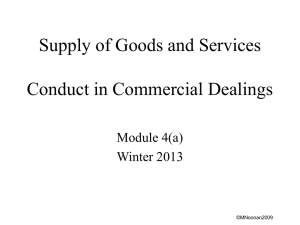
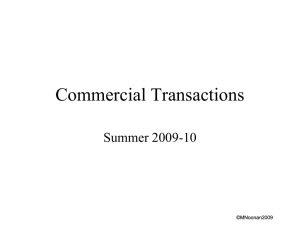
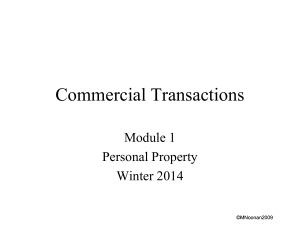
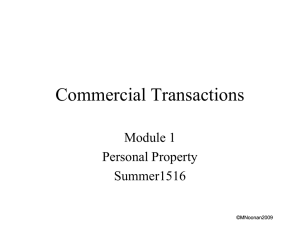
![013—BD Global [DOC 117KB]](http://s3.studylib.net/store/data/005892885_1-a45a410358e3d741161b3db5a319267b-300x300.png)
